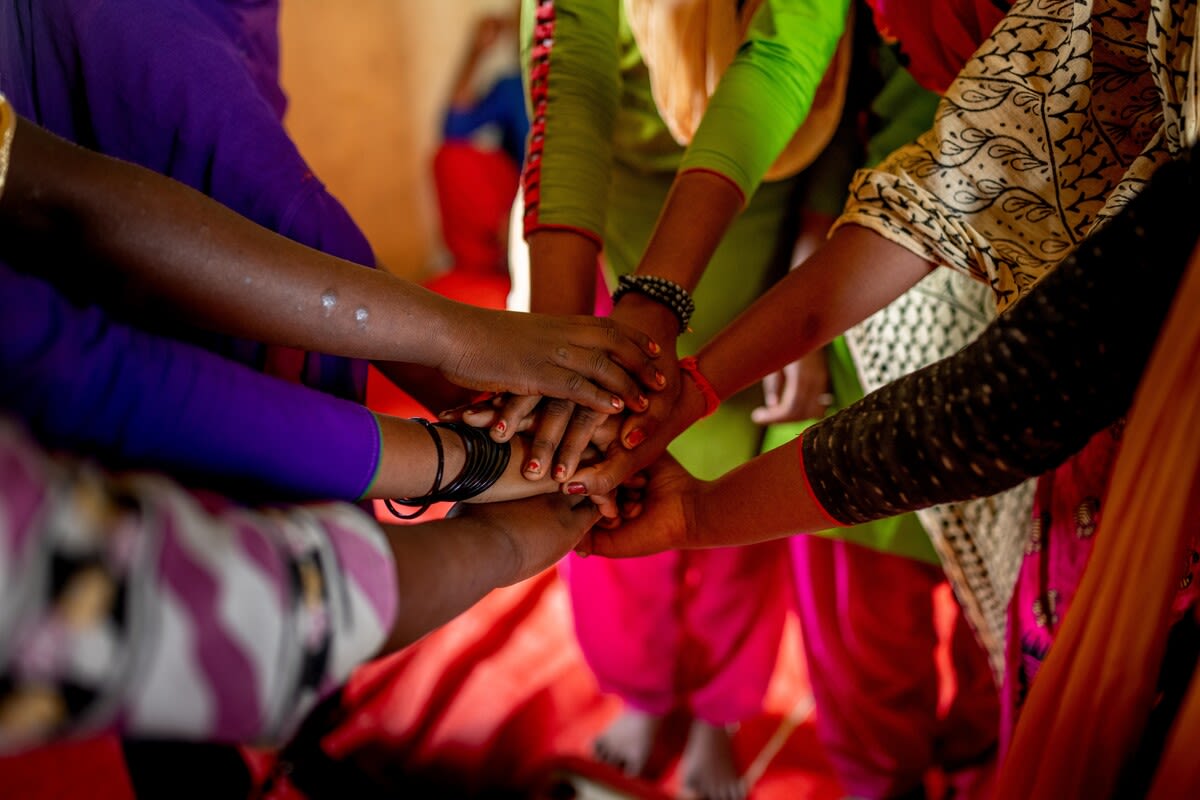2023 IMPACT
Working together to make the world a safer and more equitable place for girls and women.

Letter from our CEO
As I reflect on 2023, what is clear is the extent to which conflict, conservatism, and climate change are having a real and devastating impact on how girls and women are able to live their lives. We are seeing rates of Child, Early and Forced Marriage and Unions (CEFMU, or Child Marriage) rise in areas of fragility and conflict – highlighting that we cannot rest on our previous wins or advances.
Despite these challenges, I see many reasons for hope. I see hope from young people, passionate leaders and champions; hope from committed members and organisations at local, national, regional and global levels; hope from renewed government action and support; hope from global attention and media coverage; hope from increased funding commitments; and hope from inspirational collective action and collaboration at all levels.
We are committed to transforming the deeply ingrained biases and norms which hold child marriage in place. Throughout 2023, we have been building the ecosystem for the movement to end child marriage at every level. Girls Not Brides’ role in supporting and convening the movement has been consolidated, with a deeper footprint in regional and national movements through our members and national partnerships. We work across sectors, with a multi-pronged approach, bringing disparate groups together to identify options for change, whether through legislative change or innovative funding models. We use our convening power to bring activists’ voices closer to those of decision-makers and duty-bearers, we amplify stories of change from across the movement – highlighting where change is happening and what we are learning along the way. We are building partnerships at all levels, supporting them to develop clear and realistic strategies for change within their contexts, and building a movement of leaders to ensure civil society is strong and flourishing. And we are doing all of this with a scaling mindset – developing and making available the evidence of what works and what doesn’t to end child marriage.
We cannot end child marriage alone. Thank you for the role you play.
Dr Faith Mwangi-Powell, CEO
Letter from Chair of the Board
As Chair of Girls Not Brides, I am delighted at the progress we are able to share. Throughout the world, more individuals, more organisations, and more countries are coming together to declare their opposition to child marriage and to work together towards making the world a safer and more equitable place for girls and women. National, regional, and global coalitions are helping to channel collective efforts. Better decisions are being made based on a growing body of evidence to which Girls Not Brides is contributing.
And there can be no doubting the strength of the global commitment to end child marriage. There is now a near-universal understanding that child marriage and other forms of early union compromise every aspect of a girl’s wellbeing and damage wider social and economic development. From human rights treaties to the Sustainable Development Goals, governments across our planet have loudly declared their opposition to child marriage and their intention to work towards its end.
However, it is evident that much remains to be done. In our current trajectory, we can expect an additional 150 million girls to be married by 2030 – the same year the international community has targeted as the point at which child marriage must end. This is not good enough.
An appreciation of the scale of the challenge should be used to orient direction and maintain momentum. At Girls Not Brides we continue to work hard to identify what needs to be done and how we can best contribute. We are constantly striving to improve in ways that will help us be better partners for change – and make a real difference to the lives of the girls and women we serve.
Anne Gallagher, Chair
Annual Highlights
Support to 1400 members in over 100 countries, as the backbone organisation to the movement to end child marriage
We supported our dynamic membership through capacity strengthening, amplifying voices together, convening spaces to share and learn, and joint advocacy.
On-going deep engagements with 12 priority National and State Partnerships
Including developing capacity and co-creation of collective agendas.
Strategic Donor Meeting
We convened 10 major donors for pertinent discussions on extending funding to end child marriage, co-hosted with the Canadian Government.
Gender Leadership Programme
Bringing together leaders to gain a deeper understanding of gender transformative approaches to ending child marriage.
Human Rights Council Resolution
After considerable positioning by Girls Not Brides and our members, we were successful in our advocacy for the adoption of a strong Human Rights Council child, early and forced marriage (CEFM) resolution, co-sponsored by 78 states.
Youth take the stage at Women Deliver
Standing their ground to be heard by global leaders, young activists took to the stage to make their demands known, alongside our committed champions Mabel van Oranje, Graça Machel and Mary Robinson.
Inaugural Regional Convening in Latin America and the Caribbean (LAC)
Girls Not Brides hosted the first-ever regional convening on ending CEFMU in the region, sparking the creation of a pioneering, shared multi-year plan to combat CEFMU.
President of Malawi commits to funding ending child marriage
Working with the Girls Not Brides Malawi National Partnership, and partners at the Clooney Foundation for Justice, our collaboration in Malawi contributed to a game-changing renewal of commitment to ending child marriage from President Chakwera.
First ladies of development, Melinda French Gates, Michelle Obama, and Amal Clooney put their voices to end child marriage winning significant global attention
Through our deepening partnership with The Bill and Melinda Gates Foundation, and collaboration with The Clooney Foundation for Justice, and the Girls Opportunity Alliance by The Obama Foundation, we are positioning child marriage on the global agenda.
The First Cohort of the Movement Building and Advocacy Leadership Programme
Leaders from Africa and Asia gathered to share learning and grow their leadership skills to lead the movement to end child marriage in their respective countries.










Contents
WE HAVE CATALYSED COLLECTIVE ACTION AT A NATIONAL AND STATE LEVEL

As a partnership of over 1400 members and 12 National Partnerships/State Partnerships and coalitions in over 100 countries, we are transforming the lives of girls by focusing on different levels of influence to end child marriage. Through collaboration and collective action, we are better positioned to put Child Marriage, Early and Forced Marriage and Unions (CEFMU or child marriage) on the agenda, working from local, community, sub-national, national, regional and global levels.
Supporting our dynamic membership
Latin America and the Caribbean regional convening carried out in September 2023. © Mateo Ramirez/Girls Not Brides
Latin America and the Caribbean regional convening carried out in September 2023. © Mateo Ramirez/Girls Not Brides
In 2023 we continued to grow and strengthen the Global Partnership to End Child Marriage. We saw our membership grow in Latin America and the Caribbean (LAC), with 11 new members joining. We also carried out a ‘health check’ of our entire membership, ensuring that all Girls Not Brides members still exist and are active in the CEFMU movement.
We continued to provide opportunities for collective action to our members these included support and sponsorship to regional and global (advocacy) events, fundraising support, and opportunities for sharing and learning. Our role is having a positive impact – as confirmed by two recent evaluations: a survey amongst members showed that an overwhelming majority are benefitting from being a Girls Not Brides member, whilst an external learning evaluation of our learning work revealed that Girls Not Brides is providing leadership on CEFMU at a global level.
Source: Girls Not Brides Member Survey, 2022 And Girls Not Brides Learning Evaluation, 2023
Deep engagement in
12 priority National/State Partnerships and coalitions
Uganda National Partnership visit in February 2023. © Amos Ariyo/Girls Not Brides
Uganda National Partnership visit in February 2023. © Amos Ariyo/Girls Not Brides
Our work at a national level involves working with our membership to build strong coalitions and relationships for collective action, bringing together diverse stakeholders and creating safe spaces to foster local change around priorities and approaches for ending child marriage. This work is often complex and subtle and requires time and trust between partners. In 2023, we provided strategic and technical input, facilitated the co-creation of work and advocacy planning, supported the development of partnerships with national stakeholders, decision-makers and funders, as well as providing financial support. Our continued grant-making led to much-needed resources being released to 12 priority National and State Partnerships and coalitions.
Uganda
Girls Not Brides Uganda (GNBU):
123 members
Click to read more
Support from Girls Not Brides:
Partnership/coalition strengthening
Capacity building
Grant to support movement building, influencing and/or learning
Movement Building and Advocacy Leadership Programme
Focus Area:
The implementation of existing laws and policies to address child marriage at a national level is a key focus, as well as advocating for the costed implementation of the national strategy to end child marriage and early pregnancies. GNBU also addresses regressive social norms and attitudes, alongside supporting initiatives to strengthen the institutional capacity of the Uganda movement to end child marriage.
2023 Highlight:
The strengthening collaboration between GNBU and the government, funded as part of the Secretariat’s multiyear financial investment, has increased commitments to implement and disseminate the national strategy to end child marriage and early pregnancies. As a result, GNBU members have conducted advocacy to reinstate the Sexual Offences bill on the floor of parliament, which is expected to harmonise laws and policies on ending child marriage, as well as on developing strategies for supporting girls at risk and ever-married girls. During 2023 GNBU also diversified its membership in the humanitarian and indigenous communities of Uganda, such as the Northern and Eastern regions and areas with highest prevalence rates of child marriage and post-conflict regions.
Nigeria
National Coalition on Ending Child Marriage in Nigeria (NCECM):
73 members
Click to read more
Support from Girls Not Brides:
Partnership/coalition strengthening
Capacity building
Grant to support movement building, influencing and/or learning
Movement Building and Advocacy Leadership Programme
Gender transformative approaches project
Focus Area:
To advocate for the review and implementation of child marriage related policies and laws, including the National Social Protection Policy, the national strategy on Ending Child Marriage and a costed action plan. Social Norms change on discriminatory norms and practices towards women and girls and adapting strategies using evidence and learning on what works to end child marriage are additional focus areas.
2023 Highlight:
Members supported the review and analysis of the out-going national strategy to End Child Marriage, convening CSO partners, providing information on the level of implementation in the geo-political regions, and suggesting strategic areas for improvement in the new strategy. A key outcome of this process was the inclusion of the Coalition in the Technical Working Group on Ending Child Marriage, co-chaired by UNICEF and the Federal Government.
Kenya
Girls Not Brides Kenya (GNB KE):
62 members
Click to read more
Support from Girls Not Brides:
Partnership strengthening
Capacity building
Grant to support movement building, influencing and/or learning
Movement Building and Advocacy Leadership Programme
Youth engagement
Focus Area:
Collectively working to enhance the capacities of sub-county, sub-national and national level stakeholders is the main focus for GNB KE, working with county level officials, community promoters and the “mothers to end child marriage”. They also aim to increase the use of evidence-based data for advocacy to end child marriage.
2023 Highlight:
Having been initiated in 2017 as a coalition, GNB KE was officially launched as a National Partnership in 2023. The launch in 2023 saw national media coverage on child marriage issues and reinforced the need for partnerships and strengthening working relationships with the key government departments. These relationships will be crucial for GNB KE as they embark on working with the government to develop a national strategy to end child marriage as well as advocacy for the expansion of the mandate of the Anti FGM Board to include child marriage.
Nepal
Balika Dulahi Hoinan
(Girls Not Brides Nepal):
26 members
Click to read more
Support from Girls Not Brides:
Partnership/coalition strengthening
Capacity building
Grant to support movement building, influencing and/or learning
Movement Building and Advocacy Leadership Programme
Focus Area:
Focus areas include evidence-based advocacy for amendment of national strategy to end child marriage and its costed action plan; the development and amendment of sub-national strategies to end child marriage; and advocacy and awareness raising on policy provisions related to adolescents.
2023 Highlight:
Girls Not Brides Nepal together with National Action and Coordinating Group against Violence Against Children (NACG) Nepal, organised a national level policy dialogue on child marriage, highlighting the current context of child marriage, challenges in the country and identifying ways forward to address them jointly.
Tanzania
Tanzania End Child Marriage Network (TECMN):
87 members
Click to read more
Support from Girls Not Brides:
Coalition strengthening
Capacity building
Grant to support movement building, influencing and/or learning
Movement Building and Advocacy Leadership Programme
Youth engagement
Focus Area:
TECMN’s collective action focus is on legal and policy reform to harmonise domestic laws, including customary laws, in order to bring the minimum age of marriage to 18 without exceptions. Additionally, they work on social norms change through increased social action, acceptance and visibility, with a focus on girls’ education and FGM/C.
2023 Highlight:
Members continued to advocate for the accelerated implementation of the school re-entry guidelines for those that may have dropped out, including adolescent mothers. TECMN sits in the working group that gave revisions for the guidelines, now due to be passed and implemented, working in partnership with youth advocates, private and public school officials and community members through dialogue and social interventions to ensure all stakeholders understood the school re-entry guidelines and policy.
Additionally, TECMN youth members, in partnership with like-minded organisations, media, community members and other stakeholders, successfully participated in media learning programs and high-level national advocacy events to advocate for the change of policies and laws that safeguard the rights of girls including the Law of Marriage Act 1971.
Niger
Niger Platform to End Child Marriage:
60 members
Click to read more
Support from Girls Not Brides:
Partnership/coalition strengthening
Capacity building
Grant to support movement building, influencing and/or learning
Youth engagement and support
Education Out Loud project
Focus Area:
As part of Girls Not Brides’ Education Out Loud funded project, the Niger Platform to End Child Marriage is working closely with the national education coalition to raise awareness and carry out joint advocacy on issues relating to CEFMU and girls’ education, particularly in crisis contexts. The Platform is carrying out advocacy around Niger’s National Strategic Plan (NSP) to End Child Marriage 2024-28 and the modification of the Penal Code, which provides for a penalty for perpetrators of child and forced marriage.
2023 Highlight:
Following a youth activism and public speaking training in November 2023, youth associations were able to play a lead role in organising advocacy activities as part of the 16 Days of Activism. This included mobilising the authorities, running panel sessions, and organising a digital campaign focused on promoting girls’ education and ending gender-based violence.
Mozambique
Coligação para Eliminação dos Casamentos Prematuros (CECAP):
56 members
Click to read more
Support from Girls Not Brides:
Partnership/coalition strengthening
Capacity building
Grant to support movement building, influencing and/or learning
Movement Building and Advocacy Leadership Programme
Gender transformative approaches project
Focus Area:
Members of CECAP work from the local to the international level, on advocacy, knowledge-sharing and research to address child marriage and premature unions in Mozambique. CECAP works with the government to ensure policies, laws and services are in place that support the rights of girls and young women; and with community groups and stakeholders to address discriminatory norms and practices towards women and girls. An important focus is also to contribute to the development of national legislation to put into practice the Southern African Development Community (SADC) Model Law for the Eradication of Child Marriage and Protection of Children Already Married.
2023 Highlight:
To create greater visibility for child marriage, and to address the different social issues that pre-disposes children to child marriage, members collectively hosted a webinar on the International Day of the African Child, focused on online safety for children from Gender Based Violence and all forms of abuse, including child marriage (premature unions in their context). Online grooming of younger girls by older males, and its linkages to child marriage, was one of the topics addressed.
Rajasthan, India
Girls Not Brides Rajasthan State Partnership:
34 members
Click to read more
Support from Girls Not Brides:
Partnership/coalition strengthening
Capacity building
Grant to support movement building, influencing and/or learning
Movement Building and Advocacy Leadership Programme
Gender Leadership Programme
Youth engagement
Focus Area:
The main focus is evidence-based stakeholder engagement for system strengthening especially related to education of girls in schools after covid.
2023 Highlight:
Led by adolescent girls, Girls Not Brides members generated evidence about girls’ access to secondary education, enabling 150 adolescent girls to undertake research and share their findings with wide ranging stakeholders, including representatives from media, government, civil society and public at large.
Guatemala
La Mesa a Favor de las Niñas y Adolescentes
18 members
Click to read more
Support from Girls Not Brides:
Partnership/coalition strengthening
Capacity building
Grant to support movement building, influencing and/or learning
Leadership program
Focus Area:
La Mesa a Favor de las Niñas y Adolescente promotes the agency and participation of girls and adolescents to demand the fulfilment of their rights. They aim to strengthen work with key sectors and duty bearers at the municipal, departmental and national levels to prioritise girls’ and adolescents’ rights and the prevention of CEFMU and early pregnancies.
2023 Highlight:
In 2023 our work continued to support them with the first Grant to support movement building, influencing and learning in the region. This allowed the project “Red Voceras” to start, aiming to promote the agency and advocacy capacities of girls and adolescents to demand the fulfilment of their rights. In the last quarter of the year, 26 girls and adolescents participated in two virtual sessions and one face-to-face, where they strengthened their knowledge about the national reality, human rights, #RedVoceras campaign, CEFMU and sorority.
Jharkhand, India
Girls Not Brides Jharkhand State Coalition:
40 members
Click to read more
Support from Girls Not Brides:
Partnership/coalition strengthening
Capacity building
Grant to support movement building, influencing and/or learning
Movement Building and Advocacy Leadership Programme
Gender Leadership Programme
Youth engagement
Focus Area:
There are two areas of focus: capacity building of youth, create spaces for interface between youth and different stakeholders, and learning and evidence generation to strengthen the movement and improved action to address child marriage.
2023 Highlight:
The State Coalition used sports as a medium to address social norms related to girls and women’s role restricted to care work within their homes, supporting girls to be more visible in public spaces and build their aspirations for a future beyond marriage. The coalition also worked to increase community-level awareness regarding government schemes targeted for adolescent girls and supported them to avail scheme benefits.
Burkina Faso
CONAMEB National Partnership:
76 members
Click to read more
Support from Girls Not Brides:
Partnership/coalition strengthening
Capacity building
Grant to support movement building, influencing and/or learning
Youth engagement and support
Education Out Loud project
Focus Area:
As part of Girls Not Brides’ Education Out Loud funded project, CONAMEB is working closely with the national education coalition to raise awareness and carry out joint advocacy on issues relating to CEFMU and girls’ education, particularly in crisis contexts. Working together, they have carried out budget advocacy in four regions aimed at creating and increasing a budget line for the retention of girls in school. They are also advocating to ensure the adoption of the new Code de la Personne et de la Famille which will harmonise the age of marriage at 18 for girls and boys.
2023 Highlight:
In recognition of her work and that of the CONAMEB, Eulalie Ouedraogo, coordinator of CONAMEB national partnership, was named National Champion in the Fight against Child Marriage. An interview with Eulalie and a documentary about the CONAMEB’s work were broadcast on national TV, raising the profile of the coalition’s work and building understanding of issues around child marriage.
Uttar Pradesh, India
Uttar Pradesh State Coalition for Empowerment of Girls (UPCEG):
31 members
Click to read more
Support from Girls Not Brides:
Capacity building
Grant to support movement building, influencing and/or learning
Movement Building and Advocacy Leadership Programme
Gender leadership Programme
Youth engagement
Focus Area:
UPCEG focuses on multi-stakeholder engagement for strengthening adolescent girls' leadership.
2023 Highlight:
A Girls Not Brides grant supported 3,067 girls to engage in training on government schemes and 3,000 adolescent girls engaged to raise awareness of gender inequality, education, violence and child marriage around International Day of the Girl.
Investing in leadership to strengthen national civil society movements
Ending child marriage will only be possible if we support a movement of powerful leaders with the capacity, confidence, and support to influence across stakeholders and sectors. This is critical to sustain the movement - strengthening individual's leadership and influencing capacities, while simultaneously building a cohort of activists who cascade influence and drive the movement forward through more impactful collective action.
In 2023, we piloted our Movement Building and Advocacy Leadership Programme (MBALP) which is inspired by the great work of Oxfam International’s ‘Campaigns and Advocacy Leadership Programme’. We created this bespoke programme designed for individuals with an active leadership role in a National or State Partnership or coalition in priority countries in Africa (Ghana, Nigeria, Uganda, Kenya, Tanzania, Malawi and Mozambique) and Asia (India, Nepal, Bangladesh)
A total of 23 participants completed the programme, which focused on strengthening individuals’ skills and expertise in movement building, influencing, leadership and leading collective action. We are supporting a movement of leaders who have the skills to build the end child marriage movement in their countries by building connections between partnerships and coalitions across countries and continents. These leaders, through enhanced knowledge and skills, contribute to better and more impactful work to end child marriage.
MBALP has enhanced my understanding of issues in the continents and different cultures and contexts. Personally, it has also sharpened my understanding of various issues around leadership, movement building, how to take examples to global and have an impact on mobilising people.
Nitika Pant, India.
Among many things, I have learnt not to compromise always as this will not help me to achieve my personal goals. I have learnt that in advocacy have your facts correct and support your claims with evidence.
Eva Ankrah, Ghana.
Spotlight on Malawi - Collective advocacy resulting in a political commitment to strengthening actions to end CEFMU
Girls Not Brides’ collaboration and facilitation in Malawi contributed to a game-changing renewal of commitment to ending child marriage from President Chakwera. Working with the Girls Not Brides Malawi National Partnership and partners at the Clooney Foundation for Justice, we hosted a Round Table dialogue on the issue, bringing together human rights lawyer Amal Clooney; former First Lady of the United States and Founder of the Girls Opportunity Alliance, Michelle Obama; global philanthropist Melinda French Gates; representatives of Girls Not Brides Malawi, and a high court judge and a representative from the Women’s Lawyers’ Association to address the pressing issue of child marriage in Malawi.
The advocacy calls to action were echoed during an in-person meeting between Amal Clooney and the President and resulted in an announcement that his Government will harmonise domestic laws with the standards laid down in the SADC Model Law on Eradicating Child Marriage and Protecting Children Already in Marriage, as well as a review of the national budget and allocation of resources for the implementation of Malawi’s National Strategy for Ending Child Marriage.
Clooney Foundation for Justice co-founder Ms. Amal Clooney has assured #Malawi of support in the drive to end child marriages.
Spotlight on Nigeria and Mozambique - Embedding Gender Transformative Approaches (GTA) deep into National Partnerships
What are Gender Transformative Approaches?
We ran a series of explainers about GTA on social media with an impressive take up and engagement from a wide audience both within the movement to end child marriage and related sectors.
Child marriage is rooted in gender inequality and the belief that girls and women are inferior to boys and men. Gender Transformative Approaches (GTA) are pivotal to our current strategy and are integral to our ways of working with members.
In 2023, we worked closely with Girls Not Brides National Partnerships to embed GTA across their work, resulting in the co-creation of advocacy plans for each country and a deeper commitment and capacity in Gender Transformative programming.
Supported by UNICEF, the gender-transformative journey was the beginning of an ongoing process of critical reflection and planning for collective action to address child marriage and gender inequality. Outputs included collective advocacy for safe spaces in schools, capacity enhancement with adolescent girls, and forging new partnerships with boys and men that addressed the root causes of gender inequality.
Dorinda, gender advocate, speaking to girls at a school in Lagos Nigeria about child marriage and girls' agency. Photo by Aremu Adeolu, © Girls Not Brides
Dorinda, gender advocate, speaking to girls at a school in Lagos Nigeria about child marriage and girls' agency. Photo by Aremu Adeolu, © Girls Not Brides
Dedicated Gender Advocates
Girls Not Brides supported six dedicated gender advocates as leaders in the end child marriage movement, championing gender equality and utilising their expertise to drive forward change in their communities.
GTA Pilots
Dedicated grants enabled members to pilot activities aligned to three of the six core elements needed for gender-transformative action identified by them for the potential to address the root causes of child marriage and gender inequality in their context. These included strengthening girls’ advocacy and leadership, transforming masculinities, and family and community mobilisation.
GTA Facilitation Guide
Using evidence and learning from our GTA programmes, we have developed a 7-step facilitation guide for civil society organisations working on child marriage, making our action based learning available to the wider sector working on gender equality.
Spotlight On Guatemala – Promoting agency and advocacy of girls to demand the fulfilment of their rights
La Mesa a Favor de las Niñas y Adolescentes is the first and only National Partnership of Girls Not Brides in the LAC region. During 2023, we supported them with the first grant in the region to potentialise their collective work in Guatemala. This support included a technical accompaniment in the creation of their work plan.
In October 2023, the first grant agreement was signed with the National Partnership in Guatemala. 50% of the grant helped kickstart "Red Voceras", a project which aims to promote the agency and advocacy capacities of girls and adolescents to demand the fulfilment of their rights. To achieve their objective, a group of girls and adolescents receive training related to context, leadership, communicational and advocacy skills; and connect them with key sectors and guarantors of rights at the municipal, departmental, and national levels. In these spaces, the girls and adolescents can amplify their voices and urge government and social decision-makers to prioritise issues related to their autonomy and wellbeing, mainly in the prevention of CEFMU and early pregnancies.
Workshop of Red Voceras led by the Guatemala National Partnership. © Mesa a Favor de las Niñas y las Adolescentes
Workshop of Red Voceras led by the Guatemala National Partnership. © Mesa a Favor de las Niñas y las Adolescentes
In the last quarter of the year, 26 girls and adolescents participated in two virtual sessions and one face-to-face, where they strengthened their knowledge about the national reality, human rights, #RedVoceras campaign, CEFMU and sorority.
What's next?
In 2024 we will continue to build the capacity and provide technical and financial support to our National and State Partnerships in priority countries across Africa, Asia and Latin America and the Caribbean. 2024 will be the year of a significant prioritisation of youth leadership across all three regions, creating working groups, youth engagement strategies, and facilitating active youth participation at key regional advocacy and learning events.
WE CONTINUE TO STRENGTHEN COLLECTIVE EFFORTS TO END CEFMU AT A REGIONAL LEVEL

Social movements have the power to bring about change that no individual can do alone
In 2023, we continued to strengthen the movement to end child marriage at the regional level, by bringing together a diverse range of actors to form collective agendas, identify synergies and opportunities for collaboration. We leveraged regional bodies towards ending child marriage. We facilitated and convened safe spaces for dialogue and discussion, combining evidence, advocacy and leadership. Together, we created powerful strategies for change.
Co-creating our collective agenda at our first regional convening in Latin America and the Caribbean
During Encuentro Feminista de Latinoamérica y el Caribe, we hosted a workshop on CEFMU, where we discussed how it links with other gender-based inequalities and violence. November, 2023. © Girls Not Brides
During Encuentro Feminista de Latinoamérica y el Caribe, we hosted a workshop on CEFMU, where we discussed how it links with other gender-based inequalities and violence. November, 2023. © Girls Not Brides
A closer look at Latin America and the Caribbean...
In Latin America and the Caribbean (LAC), the informal nature of unions (characterised by cohabitation without legal registration) contrasts with the more formalised practices that can be seen in other parts of the world. Across the region, 1 in 5 girls or adolescents marry before the age of 18. It is also the only region where no significant change in prevalence has been observed over the past 25 years.
Source: United Nations Children's Fund, Is an End to Child Marriage within Reach? Latest trends and future prospects. 2023 update, UNICEF, New York, 2023.
Despite the significant prevalence rates, CEFMU is not yet seen as a key issue in the LAC region. Girls Not Brides is playing a vital role in addressing CEFMU as a public issue. We work with civil society organisations, partners and donors to influence actors in the region to move beyond legal responses and broaden the discourse for a more holistic understanding on addressing CEFMU. We do this from a participatory, intersectional, progressive human rights and gender-transformative approach.
After more than two years of complex relationship-building, engagement, advocacy and positioning, Girls Not Brides consolidated our role with the first ever regional convening on ending CEFMU.
The convening sparked the creation of a pioneering, shared multi-year plan to combat CEFMU in the region, underlining a fortified commitment to action with the participation of 54 members. The event was the culmination of a collaborative reflection process which at its heart used creative, non-hierarchical approaches that championed the autonomy and rights of girls and adolescents.
Regional convening in Latin America and the Caribbean
Thank you for accompanying the process... it has motivated me to talk about the prevention of CEFMU, now we know the contexts of other countries. We are different, we are diverse, the organisations, the women who are here, also in terms of intergenerational age. This is very valuable for the exchange of knowledge, and as a Mayan woman I also value the inclusion of interculturality.
Silvia Angelica Xinico from the Ix S'um collective, part of the National Alliance in Guatemala (La Mesa a Favor de las Niñas y Adolescentes).
Supporting civil society to advocate for financing of girls' education in West Africa
Co-creation workshop The Coalition of Civil Society to End Child Marriage in Nigeria, Nigeria, May 2023. Photo by Child and Youth Protection Foundation (CYPF), © Girls Not Brides
Co-creation workshop The Coalition of Civil Society to End Child Marriage in Nigeria, Nigeria, May 2023. Photo by Child and Youth Protection Foundation (CYPF), © Girls Not Brides
A closer look at Africa...
16 of the top 20 countries with the highest prevalence rates of child marriage in the world are in Africa.1 Regional institutions are increasingly prioritising ending child marriage by putting in place policy frameworks to guide national efforts. At a national level, some governments have demonstrated a commitment to ending child marriage through the revision of national laws, the implementation of national strategies to end child marriage and investment in programmes for adolescent girls. However, despite these advancements, current data shows that child marriage is increasing in some African countries.2
1. Source: UNICEF global databases 2020, based on Multiple Indicator Cluster Surveys (MICS), Demographic and Health Surveys (DHS), and other national surveys.
2. Source: UNICEF data with Girls Not Brides analysis in 2022: See article
Girls Not Brides’ strategy in Africa focuses primarily on working with members, National Partnerships and coalitions to influence regional, sub-regional and national institutions and governments to strengthen their commitments to address child marriage and translate these commitments into effective, integrated and inclusive action that will impact the lives of married girls, girls at risk of child marriage, and their communities.
As part of our work in West Africa, the Education Out Loud (EOL) project – made possible by the Global Partnership for Education’s fund for advocacy and social accountability – addresses the interlinked problems of child marriage and girls’ lack of access to quality education.
Contributing towards creating a powerful, cross-sectoral movement to advocate for girls’ right to education and to end child marriage, it focuses on 7 countries in Francophone West Africa with some of the highest rates of child marriage and out-of-school girls. We are doing this by bringing together end child marriage and national education coalitions for shared learning and collective evidence-based advocacy.
In 2022 and 2023, our work through EOL supported 8 civil society organisations and coalitions to advocate for country or local financing of girls’ education keeping more girls in school for longer periods, especially ensuring completion of high school education. As a direct result, we have seen the following government commitments:
Côte d’Ivoire
In Côte d’Ivoire, the Ministry of Family, Women and Children committed to expanding the mandate of the shelter for survivors of Gender-Based Violence (GBV), supporting at-risk girls to stay in school. Providing shelters not only serves as a physical sanctuary but also plays a crucial role in promoting the overall well-being of girls and young women at risk of GBV. One significant outcome is the empowerment and encouragement for girls to continue their education, as the shelter actively supports them in staying in school.
Niger
In Niger, decision-makers demonstrated greater open-mindedness towards girls’ education as a result of increased knowledge gained through the advocacy process, crucial in the current context of shrinking civic space worldwide.
Participants at the ANCEFA and Girls Not Brides Workshop 2023. Photo by Mohamed El Amine DIAGNE, © Girls Not Brides
Participants at the ANCEFA and Girls Not Brides Workshop 2023. Photo by Mohamed El Amine DIAGNE, © Girls Not Brides
It’s so important for our country to understand that young people also have the skills to advocate to end child marriage and especially through keeping girls in school.
National coordinator of the education coalition, Burkina Faso
As a result of this project, we developed a Budget Advocacy Report to share our learnings across the sector.
EOL also positioned young researchers as key stakeholders in the generation, analysis, and dissemination of data to provide decision-makers with evidence-based recommendations to end child marriage and promote girls’ education. The Youth-Led Research component played a significant role in fostering grassroots insights and youth engagement. In particular, it reflected concerns and priorities relevant to an age group most concerned by challenges around girls’ education and child marriage and creating a culture of accountability and credibility.
EOL youth researchers © Girls Not Brides
EOL youth researchers © Girls Not Brides
“The idea of using youths as researchers for the sensitive issues
we deal with is original. Youths are more agile and are flexible to change more than older generations.”
Young Researcher, Burkina Faso
Investing in gender-transformative leaders in Asia
© Girls Not Brides
© Girls Not Brides
A closer look at Asia...
Asia is home to around 290 million child brides, accounting for 45% of the global total. While South Asia leads the world’s progress in reducing child marriage prevalence, one-third of the world’s child brides live in India. Child marriage in South Asia is most common for girls living in households with lower incomes, who have less education and reside in rural areas. East Asia and Pacific account for another 95 million or 15% of the global total.1
1. Source: United Nations Children's Fund, A Profile of Child Marriage in South Asia, UNICEF, New York, 2023
In 2023, our work in Asia centred on fortifying approaches to end child marriage so that they are gender transformative and address the root cause of CEFMU: harmful gender norms.
Through the Gender Leadership Programme (GLP), in partnership with Oxfam GB, we supported a cohort of 27 gender-transformative leaders to gain a deeper understanding of gender-transformative approaches to ending child marriage. Evidence shows that laws aimed at ending child marriage are most effective when accompanied by strategies to reduce harmful gender norms and promote gender equality.
Souvik's Reflections on the Gender Leadership Programme
GLP is much more than a training on gender – it focuses on how to integrate Gender Transformative Approaches, developing individuals’ skills and confidence to become stronger, more selective and transformative Gender Justice Champions. These Champions will now act as “agents of change” within their own contexts, and influence the work of their organisations, coalitions and State Partnerships to address the practice.
What's next?
We will continue advocacy to increase political and financial commitments in each region to end CEFMU, influencing donors for increased funding for the region and advancing youth leadership for gender equality. We look forward to continuing our work in West Africa with education and child marriage coalitions with renewed funding from EOL.
WE ARE DEVELOPING THE GLOBAL ECOSYSTEM TO SUPPORT AND CATALYSE THE END OF CHILD MARRIAGE GLOBALLY

At the global level, we play a critical role in developing and supporting an ecosystem of actors, creating the enabling environment in which national and regional work sits, bringing focus to the issue of CEFMU, providing evidence to fuel discussions and commitments, and using our convening power to facilitate conversations between decision-makers and activists.
We work hard to generate political will and funding commitments to invest in evidence-based programming to end child marriage. We ensure that the expertise of sub-national, national, and regional civil society actors is escalated to policy and global development platforms.
Developing strategic alliances to platform effective child marriage interventions on the global stage
We have developed strategic alliances with The Clooney Foundation for Justice and the Girls Opportunity Alliance by The Obama Foundation, together with their high-profile CEOs, connecting via our partnership with The Bill and Melinda Gates Foundation. Together with Girls First Fund and VOW for Girls, we have created a supportive and strategic network of close collaborators to accelerate advocacy for ending CEFMU.
In November, we joined Amal Clooney, Michelle Obama and Melinda French Gates on a high-profile trip to Malawi and South Africa to profile the importance of girls’ education, increase political commitment and raise awareness globally on the issue of child marriage and effective interventions to end child marriage. The South Africa event, which included a panel of leaders from civil society organisations and featured our global champion Graça Machel, resulted in significant media coverage, with articles in over 26 media sites spanning Europe, Africa, the Middle East, North America and LAC. Following this event, Girls Not Brides also discussed child marriage on BBC News and BBC Africa.
Integrating child marriage and activist voices within gender equality platforms
In 2023, we continued to convene and focus civil society voices to influence global commitments. Our engagement at Women Deliver 2023 highlights the role we play, acting as an interface between activists and decision-makers. At Women Deliver...
We sponsored 14 members including 6 youth advocates
Our “Indaba” event created a space for members, friends and supporters to come together for informal discussions and peer-learning. Our members were supported to play an active role in two Adolescent Girls Investment Plan (AGIP) events on accountability mechanisms and funding for girls.
We convened a high-level event
Together with the Canadian Government and the UNFPA-UNICEF Global Programme to End Child Marriage, along with our champions Graça Machel and Mary Robinson and our founder Mabel van Oranje. We talked about ending child marriage in the face of polycrises. At the event, the Canadian Minister for International Development and Minister for Women and Gender Equality announced an allocation of $35 million (as part of the $200-million SheSOARS package) for the UNFPA-UNICEF Global Programme to End Child Marriage and $3 million for Girls Not Brides.
We integrated CEFMU within complementary sectors
Our CEO, Dr Faith Mwangi-Powell, spoke on a panel for the Global Programme for Education and our Head of Latin America and the Caribbean, Alma Burciaga González, spoke about the links between child marriage and menstrual health and hygiene.
Girls Not Brides hosted an official side event exclusively for our members, partners and supporters. This event was a space for discussion, learning, and collaboration, around specific topics relevant to ending child marriage as chosen by the end child marriage community.
Ensuring CEFMU Inclusion in Global Advocacy Spaces and Policy Commitments
Our global advocacy work in 2023 focused on ensuring that new global commitments related to CEFMU were generated, existing ones were enhanced, and accountability was pursued at the international level.
Human Rights Council Advocacy
At the Human Rights Council (HRC), we were successful in our advocacy for the adoption of a strong CEFMU resolution, co-sponsored by 78 states. We saw increased attention to the importance of ensuring full, free and informed consent and stronger language related to equal rights in marriage (property, inheritance, managing assets) and the dissolution of marriage. The resolution also recognised forced marriage as a form of sexual and gender-based violence, and linked CEFMU to climate change.
Our #HRC53 side event today highlighted #Education as one of the best ways to delay #ChildMarriage. pic.twitter.com/LnkxCteDjl
— Girls Not Brides (@GirlsNotBrides) June 22, 2023
UN Special Rapporteurs Statements
We also issued three position statements – developed with and endorsed by tens of Girls Not Brides members – for the UN Special Rapporteurs interactive dialogues on education, Violence against women and girls (VAWG) and custody rights, and the crisis in Afghanistan and organised a side event with Equality Now and the Pan-African Alliance to End Child Marriage.
UN General Assembly Event
At the UN General Assembly (UNGA), together with UN Women and partners from Equality in Law, we co-organised a side event ‘Accelerating Action toward Equality in Law for Women and Girls by 2030’ which gathered panellists from UN agencies and INGOs to evaluate gender equality legal progress and its limitations.
Creating and sustaining donor engagement and commitment to ending CEFMU
Our work at the global level also involves convening and advocating for increased funding in the ending child marriage space more broadly. We do this by bringing together like-minded donors and civil society and providing them with the space to learn, discuss and share the latest research and evidence around what is working to end child marriage and discuss priorities and key advocacy moments for the year ahead.
In 2023, we convened donors at our annual flagship strategic donor meeting, bringing together representatives from governments, United Nations (UN) agencies and private foundations – all of whom have a deep commitment to ending CEFMU. We also held the first Strategic Donor Meeting on ending CEFMU focused on LAC which illustrated the urgent need to invest in LAC, and the importance of transforming the type of funding invested in the region. We also hosted a donor round table in Kampala, Uganda with the Embassy of the Kingdom of the Netherlands in Uganda with a specific focus on driving meaningful collective action to address child marriage at the national level.
Participants at the donor round table with the Dutch Ambassador to Uganda Dr. Karen Boven in Kampala. Photo by CineLab Akademie, © Girls Not Brides
Participants at the donor round table with the Dutch Ambassador to Uganda Dr. Karen Boven in Kampala. Photo by CineLab Akademie, © Girls Not Brides
Amplifying voices, positioning key messages and engaging key audiences through strategic communication
We use communications to spark and catalyse influence for change by identifying, engaging and convincing diverse audiences to take actions within their power to end child marriage. From raising awareness of CEFMU to positioning and educating on relevant approaches and evidence – we seek to focus audiences, amplify diverse voices from across our partnership, showcase stories of collective action, and promote change through uptake of evidence. We do this by:
Amplifying
Amplifying the voices of leaders and champions from across our global partnership, showcasing a diversity of perspectives, stories, and expertise to ensure messaging is context-specific, nuanced, and accessible.
We shared inspiring stories from across the membership as part of our 16 days of activism for the Elimination of Violence Against Women and Girls campaign, which reached over 82,000 social media users.
Showcasing
Showcasing collective action and supporting collective advocacy messages and campaigning.
We developed a campaign for International Women’s Day specifically focused on collective messaging and actions in the LAC region, with country-specific data and messaging.
Positioning
Positioning CEFMU during critical international moments, in other sectors, and informing audiences on evidence-based solutions.
We shared critical messaging around child marriage and the Sustainable Development Goals to support advocacy asks for UNGA.
What’s next?
In 2024, our focus turns to advocacy and donor engagement at the Commission on the Status on Women (CSW), the Summit of the Future, and the UN General Assembly CEFMU Resolution. We will convene donors for critical conversations around the sustainability of funding. We will continue to leverage strategic communications to support and amplify collective action from across the global partnership.
WE ARE BUILDING A LEARNING AND EVIDENCE-BASE TO CATALYSE CHANGE

Facilitating learning and the uptake of evidence about what works to end child marriage is a central part of our work.
We source, collate and share evidence in accessible formats across our membership and networks, with the aim of advancing understanding of critical issues affecting the movement to end child marriage and to influence multiple levers such as civil society, academia, policy development and resource commitments. We increasingly have clarity on what works to address child marriage and what evidence gaps still exist, ensuring that all investment towards ending marriage is evidence based and effective. Beyond this, we convene learning environments and work together to identify where the gaps are so these can be filled, building a peer-to-peer culture of learning and evidence generation – key to accelerating efforts to end child marriage.
Increased access to contextualised evidence on what works to end child marriage
Over 2023, we have increased access and supported members to share contextualised evidence to support efforts to end child marriage. We have provided members with opportunities to learn and share, either through our learning series, Child Marriage Research to Action Network (CRANK) meetings, or regional convenings and published research and evidence briefs.
One area of focus was on addressing child marriage and supporting married girls in humanitarian settings – a good example of the range of outputs and engagements we produce or host for one issue, to ensure both broad and deep uptake.
A co-ordinated learning approach:
Learning call strengthening evidence uptake across humanitarian, development and peace sectors.
Brief published on exploring the drivers and consequences of conflict-related sexual violence and child marriage – contributing to filling evidence gaps by presenting the latest evidence on what works and a key set of key recommendations.
Presented latest evidence on child marriage in humanitarian, conflict and crisis settings at the Global Protection Forum Innovation Corner hosted by Plan International and Save the Children.
CRANK research meeting, ‘Child marriage in conflict- and crisis-affected settings – Learning from the latest evidence’ in which we discussed recent evidence and learnings. Learn more
CRANK Research Spotlight covering the latest research and evidence related to child marriage programming in conflict- and crisis-affected settings to strengthen interventions and better inform advocacy policy efforts. Learn more.
Participated at a child marriage research convening hosted by Kings College London (KCL) in collaboration with the Feminist Visions to End Child Marriage in East Africa (FVECM).
Participated in the Middle East and North Africa Regional Action Forum to End Child Marriage convening, developing a joint advocacy and learning agenda to support and strengthening the efforts of all network members, with an emphasis on prevention and response efforts in conflict and crisis settings.

Find Out More
We are recognised as a knowledge hub and “go-to” platform for what works to end CEFMU globally
An external evaluation of our Learning work showed Girls Not Brides offers a wide range of high-quality learning products, which are relevant and valuable to member organisations, enhancing their understanding of the issue. The evaluation showcased how we provide complementary, tailored support aligned to member organisations’ needs and reiterated our role and commitment to being a thought leader in the ending child marriage space.
Globally, Girls Not Brides’ role as a thought leader that uses evidence to influence policy and programmatic interventions to end child marriage was widely recognised in the evaluation. We are doing well on sharing learning, promoting promising practices and contributing to shaping the debate around the child marriage agenda.
Africa/EOL/Youth Researchers 2023 © Girls Not Brides
Africa/EOL/Youth Researchers 2023 © Girls Not Brides
We are offering members a unique, highly valued and applicable evidence base:
Source: Girls Not Brides Learning Evaluation, 2024.
We co-ordinated a global approach to research on child marriage, providing an effective go-to forum for evidence and learning
The Child Marriage Research to Action Network – or CRANK as it is known – is a joint initiative and platform for a coordinated global research agenda on child marriage, between Girls Not Brides and the United Nations Population Fund (UNFPA) - United Nations Children’s Fund (UNICEF) Global Programme to End Child Marriage. The CRANK provides a platform for a better coordinated global research agenda, disseminates the latest evidence on child marriage priority topics and encourages the uptake of evidence by practitioners and policymakers.
In 2023 CRANK held four research meetings focused on Gender-Transformative Approaches, CEFMU in conflict and crisis-affected settings, CEFMU policy responses and recent evidence reviews, attracting contributions from researchers, programmers, policymakers and activists across the world. Since its inception in 2021, the CRANK membership has grown to 540 with representation from all actors and from around the world. The final meeting of the year – Progress, Gaps and Priorities – was a key highlight of the CRANK's work in 2023.
The external evaluation shows that the CRANK is effectively serving its core objective to disseminate evidence on child marriage priority topics and deepening many stakeholders’ understanding of child marriage evidence, solutions and emerging priorities.
CRANK is an effective go-to forum for evidence and learning, leading to strengthened action and programming:
Source: Girls Not Brides Learning Evaluation, 2024.
We are strengthening learning and evidence sharing at the Africa regional level
In July, the Africa Action Group to End Child Marriage (AAGECM), co-created by Girls Not Brides and regional partners to serve as a regional hub for learning and evidence-sharing, united 30 participants from 13 countries to continue these important conversations.
The meeting brought together researchers, young visionaries, practitioners, advocates, and activists, providing a comprehensive evidence review and assessing the current state of knowledge on child marriage, identified gaps, and paved the way for further research. The forthcoming report, featuring an extensive literature review, is set to significantly contribute to the global body of evidence on what works to end child marriage. Through the AAGECM, we have established a collaborative space where researchers, policymakers, practitioners, and civil society organisations converge, facilitating knowledge exchange and discussions on translating research findings into impactful policies and practices.
Day 1 Africa Action Group to End Child Marriage Workshop: Advancing the evidence base on strategies to end child marriage and support married girls (4-6 July) © Girls Not Brides
Day 1 Africa Action Group to End Child Marriage Workshop: Advancing the evidence base on strategies to end child marriage and support married girls (4-6 July) © Girls Not Brides
The 2023 AAGECM Convening wasn't just an event; it was a catalyst for change. We are not just building a platform; we are fostering a community that applies and scales successful strategies. Our long-term goal is to put an end to child marriage, ensuring a safer, healthier future for every child.
Fatou Ndir, Senior Advocacy & Engagement Officer, Girls Not Brides
What’s Next?
In 2024, we will be publishing a new brief on child marriage in conflict, crisis and humanitarian settings, one of our core evidence and learning briefs this year. We will produce an evidence review and brief on CEFMU laws and their impact on child marriage and girl’s agency, as well as furthering our work on CEFMU and Climate Crisis. We will implement the learnings from our external evaluation and continue our work with the CRANK.
Who We Are
Girls Not Brides is the global partnership working collectively to end child marriage so that girls can fulfil their potential. We are formed of over 1400 civil society member organisations in over 100 countries.
The Girls Not Brides Secretariat supports and facilitates the movement, partnership, members and activists at different levels. We do this through:
Movement-building
Leverage the collective power of the global Partnership of member organisations, National and State Partnerships and coalitions for accelerated action to end child marriage.
Influencing
Galvanize the wider global end child marriage movement to drive change nationally, regionally and globally.
Learning
Leverage knowledge, learning and evidence to address child marriage across the movement.
Our Team
Girls Not Brides Secretariat, October 2023 © Girls Not Brides
Girls Not Brides Secretariat, October 2023 © Girls Not Brides
Diversity
We continue to make strides to increase the diversity of our teams from global to local. In 2023, we hired eight (8) more fabulous team members in the regions to deepen the support to our members. We now have 20 team members in our regions and 27 based in London, UK.
Fairshare recognition
Emphasising our commitment to transforming the make-up and diversity of our organisation has led us to rank 6th in the global FAIR SHARE Monitor. The FAIR SHARE Index measures the gap between the proportion of women leaders and proportion of women on staff. FAIR SHARE International Monitor 2023
Safeguarding
We continue to embed safeguarding throughout Girls Not Brides. Over the year, we have revised our Safeguarding Policy in line with the sector incorporating improvements within the policy. This will be rolled out to all our teams in 2024.
Financial Investments to the Membership
In September, we invested in additional capacity to support our financial investment coordination and processes. This has helped to increase our grant making to members and partners and sets up the foundation our ambition to support the membership in future years.
Governance
We continue to strengthen areas of our governance at a Board level. In December 2023, our Trustees met to create a workplan for 2024 to support the reform of making the board governance more effective and efficient.











































































